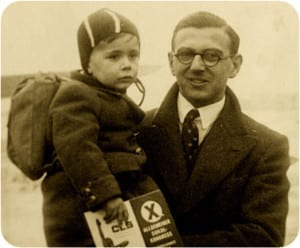Nicholas Winton Is Dead at 106; Saved Children from the Holocaust – July 1, 201t New York Times

The photo is from the New York Times article highlighted at this blog post. The caption reads: “A family picture of Nicholas Winton with one of the hundreds of Jewish children whose lives he saved during World War II. Credit Press Association, via Associated Press.”
A July 1, 2015 New York Times article is entitled: “Nicholas Winton Is Dead at 106; Saved Children from the Holocaust.”
An excerpt reads:
- Nearly all the saved children were orphans by war’s end, their parents killed at Auschwitz, Bergen-Belsen or Theresienstadt. After the war, many remained in Britain, but others returned to Czechoslovakia or emigrated to Israel, Australia or the United States. The survivors, many now in their 70s and 80s, still call themselves “Winton’s Children.”
- Among them are the film director Karel Reisz, who made “The French Lieutenant’s Woman” (1981), “Isadora” (1968) and “Saturday Night and Sunday Morning” (1960); Lord Alfred Dubs, who became a member of Parliament; Joe Schlesinger, a Canadian broadcast correspondent; Hugo Marom, a founder of the Israeli Air Force; Vera Gissing, the author of “Pearls of Childhood” (2007) and other books, and Renata Laxová, a geneticist who discovered the Neu-Laxová Syndrome, a congenital abnormality.
[End of excerpt]
Updates
A study of relevance to the topics at hand is entitled: Remembering the Holocaust: A Debate (2009); a blurb reads:
“Remembering the Holocaust explains why the Holocaust has come to be considered the central event of the 20th century, and what this means. Presenting Jeffrey Alexander’s controversial essay that, in the words of Geoffrey Hartman, has already become a classic in the Holocaust literature, and following up with challenging and equally provocative responses to it, this book offers a sweeping historical reconstruction of the Jewish mass murder as it evolved in the popular imagination of Western peoples, as well as an examination of its consequences.
“[Jeffrey] Alexander’s inquiry points to a broad cultural transition that took place in Western societies after World War II: from confidence in moving past the most terrible of Nazi wartime atrocities to pessimism about the possibility for overcoming violence, ethnic conflict, and war. The Holocaust has become the central tragedy of modern times, an event which can no longer be overcome, but one that offers possibilities to extend its moral lessons beyond Jews to victims of other types of secular and religious strife. Following Alexander’s controversial thesis is a series of responses by distinguished scholars in the humanities and social sciences–Martin Jay, Bernhard Giesen, Michael Rothberg, Robert Manne, Nathan Glazer, and Elihu & Ruth Katz–considering the implications of the universal moral relevance of the Holocaust. A final response from Alexander in a postscript focusing on the repercussions of the Holocaust in Israel concludes this forthright and engaging discussion.
“Remembering the Holocaust is an all-too-rare debate on our conception of the Holocaust, how it has evolved over the years, and the profound effects it will have on the way we envision the future.”
[End of text]
An Aug. 15, 2016 Guardian article is entitled: “Joseph Goebbels’ 105-year-old secretary: ‘No one believes me now, but I knew nothing’: Brunhilde Pomsel worked at the heart of the Nazis’ propaganda machine. As a film about her life is released, she discusses her lack of remorse and the private side of her monstrous boss.”E
A June 20, 2017 London School of Economics and Science article is entitled: “Book Review: The Holocaust: A New History by Laurence Rees.”

Leave a Reply
Want to join the discussion?Feel free to contribute!